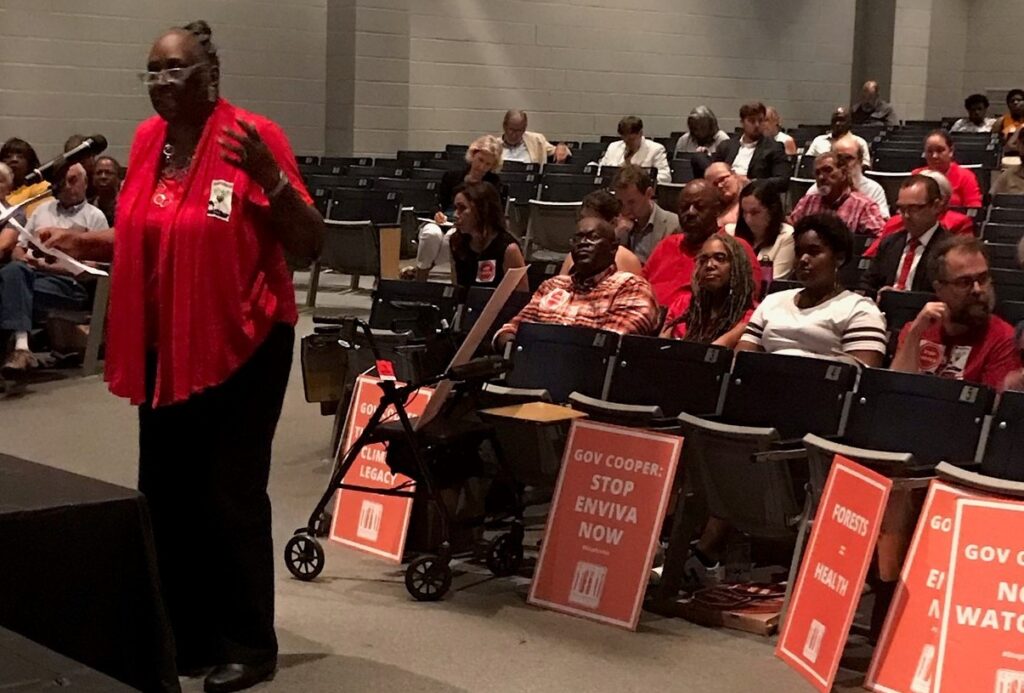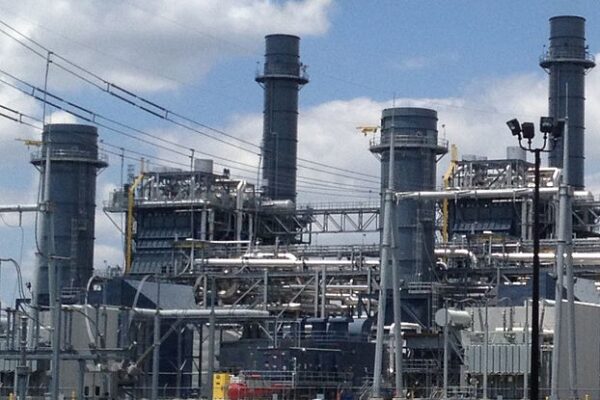
20 years ago, at a time when few in NC were aware of the rapidly growing wood pellet industry, CWFNC’s Northeast Organizer, Belinda Joyner, got word from a contact in Ahoskie, just east of her in Hertford County, of what it was like living with huge Enviva wood pellet mill. Terrible noise 24/7 from the massive mills chewing up logs to be made into pellets to be burned in electric power plants, mostly in Europe. Heavy, dangerous truck traffic through a community only hundreds of feet away. And perhaps worst of all, the sticky wood dust that was everywhere, a nuisance on homes, yards and cars, but a real health hazard to those forced to breathe it every time they stepped outside.
(Image- Belinda Joyner speaking at 2019 hearing on wood pellets, as community members look on.)
Belinda and Hope traveled to Ahoskie ,met with concerned residents who had contacted us, then visited door to door in nearby neighborhoods to learn of residents’ experiences and concerns. Over two years, we met with the diverse community members several times and built visible resistance to Enviva’s practices. Working with impacted neighbors, we investigate the company’s permits, what to do about the noise and dust and began learning about a predatory industry that was aggressively working to build more wood pellet plants, always in low income communities of color with little political power. The NC Division of Air Quality, which had been unaware of the problems caused by the plants, responded to the community’s pleas by requiring Enviva to implement an enforceable dust control plan, which reduced dust substantially. Sadly, noise, which can cause major stress and sleeplessness, is not considered an environmental threat by the state agency, and the local Ahoskie government was unwilling to apply their noise ordinance to an industry that was contributing hundreds of thousands of dollars in taxes.
When her local planning board discussed approval of an Enviva plant not far from her own western Northampton County home, Belinda, who is also President of the Concerned Citizens of Northampton County, reached out to residents close to the proposed site for the plant, trying to build resistance to the new facility, but she was met with indifference and hopes for sone new jobs. As soon as the Enviva mill started operating, the community realized their mistake in not preventing Enviva from building the plant. Meanwhile, the Dogwood Alliance, which focuses on forest issues throughout the southeast, was learning about the wood pellet industry’s major impacts on forests and heard of Belinda’s work in Northeast NC. Dogwood collaborated with Clean Water for NC on a video that focused on the environmental injustices the industry was forcing on communities, while wreaking havoc on forests, too.
Video Partnering with Dogwood Alliance:
For over 10 years, Belinda has also worked closely with the Dogwood Alliance on initiatives to investigate harms to communities, take action to hold Enviva and Drax, another huge wood pellet manufacturer, accountable, educate Clean Water for NC and the regional media about the industry, and resist a major new port facility in Wilmington for shipping wood pellets to Europe. Because several European countries offered “clean energy” subsidies to electric generators there to burn wood pellets instead of coal, the market for wood pellets grew quickly and the US industry expanded through the southeast, always location in Environmental Justice communities.
After years of advocacy and independent investigations, it has become clear that utilities that burn wood pellets are even worse emitters than coal plants, and the climate impacts, including the loss of forests and transportation of the pellets over thousands of miles, are even worse than coal. European governments are waking up about their misguided policies and are removing subsidies for burning wood pellets. The industry is finally experiencing major financial setbacks.
Belinda shakes her head as she says, “The very least they could have done was try to be a better neighbor and make their operations less harmful to their community!”. Her relentless work with community partners, Dogwood Alliance and keeping Clean Water and other Environmental Justice allies involved in action and advocacy has been a big part of why Europe’s policies are changing and the harmful wood pellet industry is now starting to shrink. It never created more than a few jobs, and the costs to communities were huge. We salute Belinda and the outspoken community members she has motivated and empowered for their persistent and determined work to hold this industry accountable.


